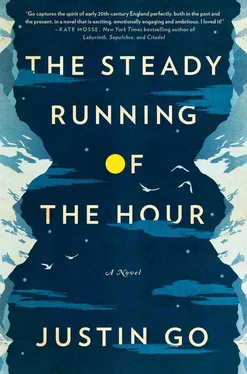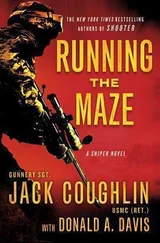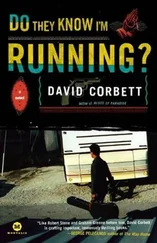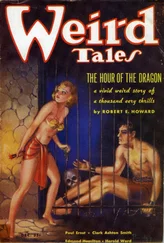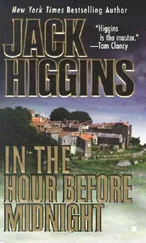12. After the war, Ashley tells Eleanor that he won’t give up trying to find Imogen. She replies, “You are giving something up…. You just don’t realize it.” Is she correct? What is Ashley giving up by continuing to search for Imogen? Why do you think he persists?
13. Book 3 begins with an epigraph that, in part, reads, “If you are a brave man you will do nothing: if you are fearful you may do much, for none but cowards have need to prove their bravery.” Discuss instances of bravery that occur in The Steady Running of the Hour . Do you think that Imogen is brave for the way she handles her relationship with Ashley? Why or why not?
14. Duties figure prominently throughout The Steady Running of the Hour . When Imogen asks Ashley to leave the army, he tells her he cannot, because, he says, “I’ve a duty.” Do you agree with his decision to “see this through”? Why or why not? Does Imogen have any responsibilities toward Ashley? What are they? What duties does Tristan have toward Ashley’s estate, if any?
Enhance Your Book Club
• Ashley Walsingham died in an attempt to summit Mount Everest. Learn more about Mount Everest here, http://www.history.com/news/7-things-you-should-know-about-mount-everest, and also here: http://en.wikipedia.org/wiki/Mount_Everest.
• Ashley believes that “it is climbing that makes one feel.” What does he mean? Talk about your passions with your book club. What do you do to make yourself “feel”?
• Tristan’s quest takes him from London to the Somme battlefields and onward to the Eastfjords of Iceland and beyond. Describe the cities that Tristan finds himself in. What would you do in each?
• To learn more about Justin Go, and more about the journeys and research he undertook to write The Steady Running of the Hour , visit his official site at http://www.justingakutogo.com.
A Conversation with Justin Go
The Steady Running of the Hour is your first novel. What’s been the most rewarding part of the experience of publishing your book? Was there anything that surprised you about the publication process?
It’s incredible just to see the book coming out. I worked on it for seven years, but even in the better periods I had grave doubts about the whole endeavor. When I finally learned the book was going to be published, I felt relieved simply to know I hadn’t been crazy all along. You give so much of your life to something like this, but you can’t count on getting anything back, not from the world at least. It meant everything just to be able to call myself a writer.
What I find remarkable about publishing is what a long and careful process it is. It’s almost like raising a child. When you’re waiting for your first book to appear, it can be painfully slow, but the exactitude is what makes it special. In a world where much of what we read was completed within minutes or hours, there’s something unique about books. There are more than a hundred thousand words in my novel. I can tell you I looked pretty hard at every single one of them, and other people did too.
As a debut novelist, do you have any advice for aspiring writers? Now that you’ve published your first book, do you wish you had done anything differently?
I think any aspiring writer should first decide if he or she really needs to do this. Writing novels is probably the longest and most unlikely path you could take toward fame, fortune or even happiness. But if you must write, put everything into finishing that first draft. Be fearless, if only for an hour or two each morning. Until I started writing, I didn’t realize how much fear had kept me from the life I wanted. I was afraid to write badly, so I didn’t write. I was afraid to be alone, so I didn’t move abroad.
Eventually I realized that the only thing that guarantees failure is never trying. If you aren’t willing to take risks and sometimes write badly, you’ll never discover what you can do. The miracle of fiction isn’t producing an adequate chapter that fits into your plot. It’s pulling out something from inside you that you didn’t know existed. The trick is to keep reaching for that, morning after morning.
Looking back, I wish I hadn’t doubted myself so often. A writer, especially a beginner, should be humble and always trying to learn. But it’s awful to stand on the brink of giving up. If you’re brave enough to write a book, be proud of yourself and keep going.
Like Tristan, you dropped everything to go on a European adventure, quitting your job and moving to Berlin. What motivated you to move to that city? How did you prepare for the transatlantic move?
I lived in Europe on and off after college, but eventually I wound up working at a law firm in New York. It was a good job and I loved living near my friends. But I felt unsatisfied. I wanted more to my life than an office job, and I felt I had something to give, but I didn’t know where to put it.
I started working on the book. I’d tried writing fiction before, but after I developed this story it became more serious. I wrote nights and on weekends. Gradually I realized the book was the one thing I was doing that I really cared about.
A few years before this, I’d stopped in Berlin for a few days, and I’d been fascinated by it ever after. It was unlike anywhere I’d been in Europe — a vast capital full of unpredictable spaces. When you went out in Berlin, you never knew where the night would take you. I thought it would be the perfect place to write a book.
So I saved as much money as I could and quit my job. I left for Berlin with a plot outline, a few rough scenes and three suitcases full of research books. Even once I was on the plane I couldn’t believe I was really doing it.
In The Steady Running of the Hour the action alternates from World War I to present day. Why did you chose to structure the novel with alternating chapters? Was it difficult to change time frames while you were writing? Or did you write each time frame all at once?
I alternated the chapters because I wanted both stories to progress at the same time, and I didn’t want the past to feel too “historical.”And I wanted them both in the present tense, to have the same immediacy. A big question in the book is whether Tristan’s life — or anything in our contemporary lives — can measure up to this epic notion of history, the Great War or the Battle of the Somme. But people don’t think about history while it’s happening. It’s personal mythologies that matter, the stories that Ashley tells himself about Imogen for seven years, or the way that Tristan feels about Ashley and Imogen.
I didn’t write the book in chronological order. I just wrote scenes when I felt ready. The Everest and war chapters were written last, because I wanted to research as much as possible before writing. I felt so much pressure to get the historical chapters right that it was a relief to write Tristan’s chapters, because I could relax a bit and rely more on firsthand experience.
Anton DiSclafani called The Steady Running of the Hour “an astonishingly vast, meticulously plotted, and beautifully told novel.” There are so many twists and turns throughout Tristan’s quest: can you tell us how you were able to plot them out so precisely? Did you know how Tristan’s search would end when you began writing?
When I started the book I plotted it carefully. I probably made ten outlines in ten different notebooks. I felt everything had to unfold in a very particular way. But of course I made mistakes, or characters or events changed and I had to replot things.
As the writing went on, I realized that knowing what happens is just the beginning. Next you have to figure out how things will happen, where they will occur among the alternating story lines, which characters will know about them and how they will find out. The infinite permutations are enough to give you a headache. Eventually you have to just follow your instinct.
Читать дальше
